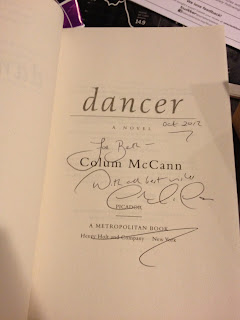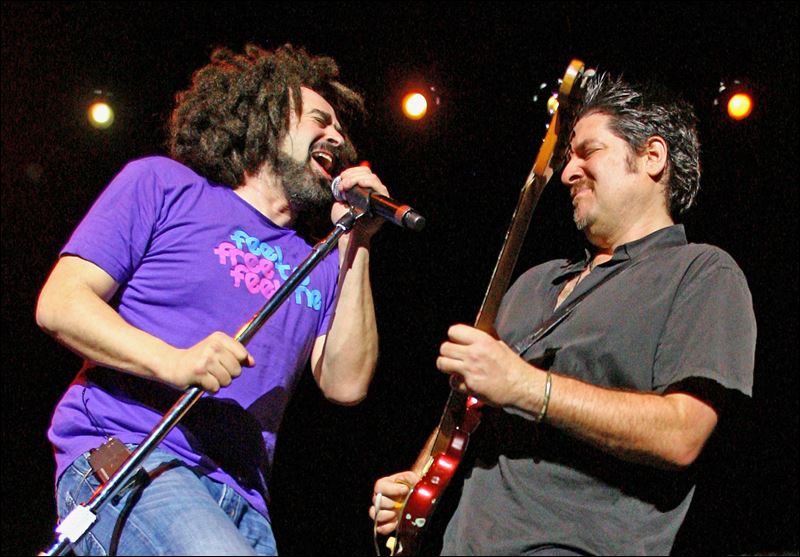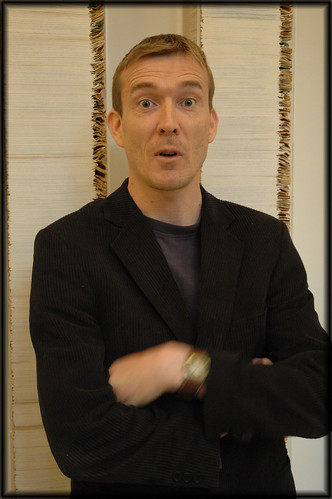Though I always get excited to see authors I admire, I was particularly excited about last night's event: Salman Rushdie would be speaking with Colum McCann about his (Rushdie's) newest book
Joseph Anton. Rushdie is someone I've long admired for his unparalleled ability to craft great, swooping stories while dazzling readers at the micro level with word play at the same time. McCann certainly doesn't yet have Rushdie's track record, but
Let the Great World Spin - a National Book Award winner
and the subject of a Legit Lit
post) made me a solid fan of his, and I'm eager to read more. I would have anticipated an inspirational showing from either of these great men individually, and I figured that, together, they'd be better than the sum of their parts.
The evening kicked off with an introduction from
Granta editor John Freeman. He started off every bit as awkwardly as he did when introducing David Mitchell just days before, and I felt a little sorry for him; he's clearly a master of the written word, but speaking those words seems to pose a different challenge. But then McCann piped up, objecting to Freeman's calling Rushdie "Mr. Salman Rushdie" when McCann himself had been introduced only as "Colum McCann." The audience tittered slightly as Freeman rolled his eyes and allowed that "Mr." McCann would be speaking with Mr. Rushdie, then was uninterrupted again as Rushdie pointed out, almost under his breath, "It's 'sir,' actually." (Rushdie was knighted in 2007 as part of the Queen's Birthday Honours.) This seemed to break the ice for Freeman, who laughed along with the rest of us, and later, stumbling over "misters" and "sirs" sighed, "This is really going to f*ck me up." The evening was off to a good start.

McCann seemed nervous at first. A New Yorker by way of Ireland, he punctuated nearly every other word with "em" as the conversation began. "So, em, I thought, em, well, em, what question will I, em, will I begin with, and then, em, I thought, I thought maybe, em, we could, em, start, em, with your father. What what what what was it like for you...?" Oh boy, perhaps this wasn't going to be as enjoyable an evening as I'd thought. But McCann seemed to find his stride quickly, and his speaking style, while remaining eccentric, settled into fluency. I was amused by his costume: a plain gray blazer, jeans, and a white button-down with a rather jaunty orange plaid scarf wrapped around his neck. In searching for an image of him for this post, however, I discovered that while the scarf itself varies, its presence seems to be an important ingredient in his signature look. He consulted a small, brown notebook throughout the evening and seemed a bit jumpy, but jovially so.
Rushdie wore a taupe suit with a white checked shirt underneath and, amusingly, maroon socks. He seemed much more at ease than McCann, an attitude befitting his many years of experience and allegedly considerable ego, though he did have a habit of fiddling in his left coat pocket from time to time with the hand that wasn't occupied by the microphone. He has a white goatee and a ring of black hair surrounding a very bald, shiny pate. His most distinguishing feature is his right eyebrow, which juts up at an almost impish angle, making him look like he's constantly amused. And he is very, very funny - he made references to Monty Python and, in regard to a disguise he once wore, deemed himself "gorgeous" in a wig. His smooth British accent contrasted with McCann's perky brogue as they discussed
Joseph Anton (Rushdie's pseudonym during the decade he was in hiding, a construction of the first names of favorite authors Joseph Conrad and Anton Chekov) and numerous other provocative and entertaining topics.

Of course, religion was explored thoroughly. Rushdie was raised by a father who was more of a scholar of Islaam than a believer; Rushdie pointed out that most atheists are obsessed with the idea of God. He also identifies as an atheist, though has no objection to people practicing their beliefs in private, and he did tell McCann that, as writers, he was sure they both understood that "there's a thing in [people] that is not just flesh and bone." Discussion of the
fatwa was also inevitable. I was a bit surprised that we didn't have to go through a metal detector when entering the theater, and there didn't seem to be any security. When McCann asked about the current threat to Rushdie, the older man asserted that "those days are gone," though allowed that there are certain countries he still cannot visit. McCann made a crack about taking Rushdie on the subway, and Rushdie countered that he takes the subway all the time, as, after all, there are times when one simply cannot get a cab. "Wow, that's fantastic!" McCann exclaimed. "No, it's just taking the subway," said Rushdie mildly.
I've never read any of Rushdie's non-fiction, and it was strange to think about this author, who I associate with magical realism, writing about his own life. But the memoir does sound a bit like a novel - at least the part he read aloud for us, anyway - because it's written in third person. Rushdie said he tried writing in first person and didn't like the resulting test, and that it was just easier to "turn the lens on himself" this way. Rushdie felt sharply criticized by the British media, particularly during the first months of the
fatwa, and said that people were making up versions of him all over the place so it was nice to have his own chance to invent a version of himself, though his is factual. I can't imagine what it must have been like to be in hiding for ten years. Rushdie said that the hardest thing to convey to people is "the idea of duration" because people understand a moment of crisis, but it's harder to extend that comprehension when the crisis lasts for a decade. McCann pointed out that Rushdie looks younger now than he did in his 40's due to the stress of the experience, and Rushdie agreed whole-heartedly. That, he said, was the reason there are no pictures in the book. "I looked like sh*t." he said. "It's appalling." He maintains that being a writer saved him. "Writers are used to sitting in a room, looking out the window, wondering what the f*ck to do," he said. (I was delighted that someone who can use English with more grace and skill than almost anyone on the planet was not above the frequent use of casual profanity.)
Rushdie is a notorious social butterfly, and it was rather titillating to hear about how he'd meditated with Allen Ginsburg, played ping pong with Jonathan Safran Foer, argued about Wodehouse quotations with Martin Amis, commiserated with Ian McEwan about their mutual struggles getting published, sent manuscripts to Christopher Hitchens, and spent a weekend with Kurt Vonnegut. It felt, on some levels, like name dropping, but I reminded myself that this was his social circle, after all; of course he's going to use their names. What else would he call them?
.JPG) |
| "For Beth - With all best wishes" |
I most enjoyed the conversation that circled around the craft of writing. Rushdie loves poetry, not just as a genre but because he believes that one can get lazy writing prose, churning out "meat and potatoes sentences" (which have their place, but shouldn't be relied upon too heavily). Poets, he says, really pay attention to language, and he reads several poems each day to remind himself to do the same. He doesn't write poetry himself, however, because it scares him. McCann said that each time he finishes a novel, he worries that he's out of stories, sitting back and thinking, "I'll never be able to do that again." (This from a young author who has already written eight novels and short story collections.) He asked whether Rushdie has every experienced this feeling, and Rushdie responded without hesitation, "Every time." But, he added, "it doesn't show up if you don't plug away at it." You've got to just jump back in and work, and something always comes. As the author of 28 novels, major essays, and collections, I feel confident in trusting him on this.
Despite his spellbinding talent for storytelling, reviews for
Joseph Anton have been somewhat critical. Rushdie said that he cut 200 pages from it before publication, but most critics agree that it is still far too long. The popular opinion seems to be that there are gems in it, but that his ego outshines them and makes the whole thing somewhat off-putting, and there is speculation that Rushdie's eye for effective content, while keen for writing fictional stories about made-up characters, is somewhat clouded when it comes to writing about himself. And
Joseph Anton contains lots and lots of name-dropping. Each person at last night's talk got a free copy, so I will probably at least read part of mine; the beginning, it seems, is fascinating and superbly wrought.
.JPG)
As we lined up for the signing afterward, I was distressed to see that McCann did not seem to have a table set up. I asked an employee, and sure enough only Rushdie was scheduled to do a signing. I was emboldened by memories of my disappointment at the end of David Mitchell's talk last week. I hemmed and hawed for a few minutes, then I asked my friend Jeremy to hold my place in line and made my way up to the side of the stage where McCann was chatting with someone. When he finished, I tremblingly blurted out that I was a big fan and knew he wasn't doing a signing but if it wasn't too much trouble I'd really appreciate it if he'd sign the book I'd brought if he didn't mind. He was happy to oblige, and we chatted a bit as he scrawled a message and his name on the title page. My interaction with Rushdie was less interactive, as I was too nervous to do anything more but squeak "thank you," and flee. Jeremy, however, chatted and laughed with Rushdie (who had a glass of whiskey on the rocks perched on the corner of the table) for a few moments. Jerk.
I am less an unconditional fan of Rushdie than I was yesterday morning after seeing this talk and doing some research. But there's no question that he is a man to be enthusiastically read and admired. And I'm grateful for the ways McCann said Rushdie has inspired him, and many other young authors, who are using gorgeous language of their own to tell the important stories that explore what it is to be human and make me feel more alive.




.JPG)
.JPG)


.JPG)
.JPG)







